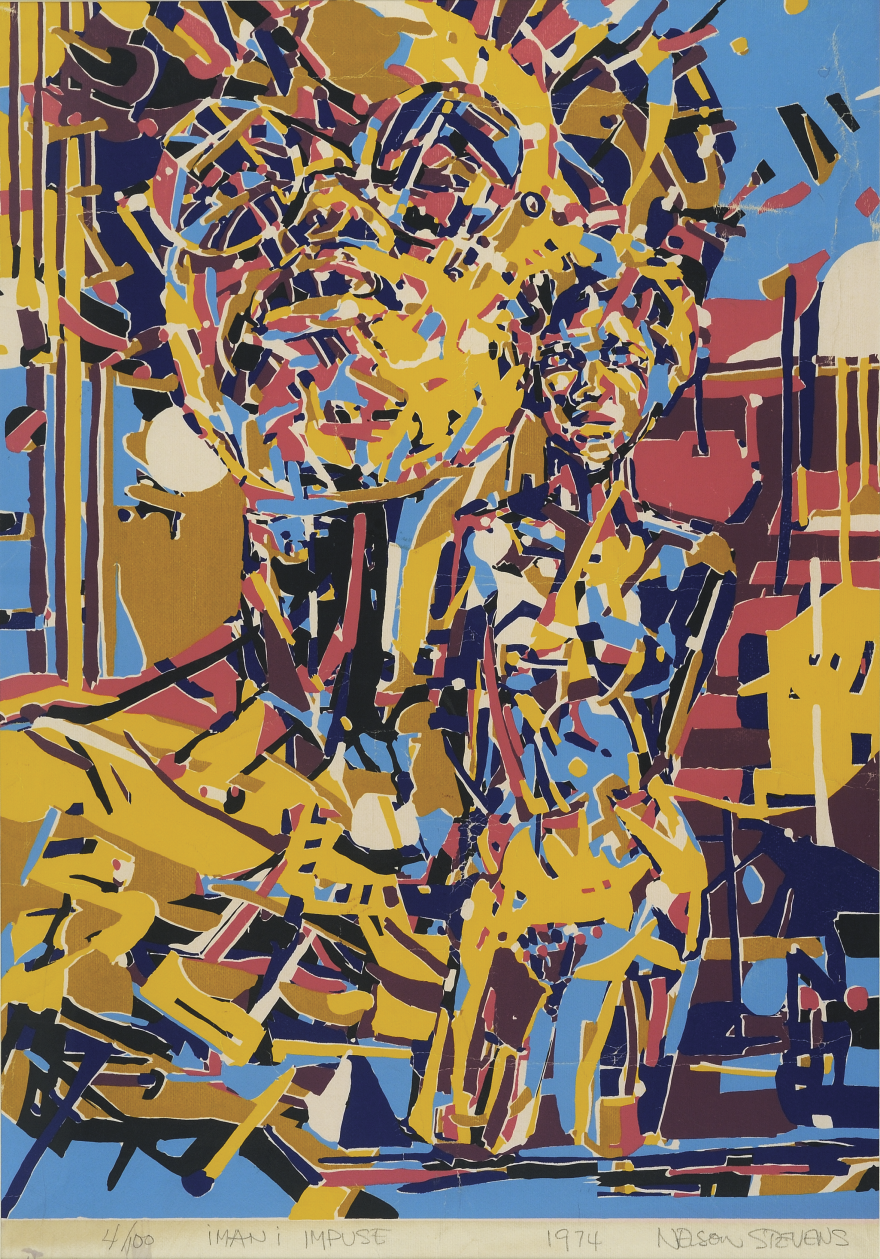A collection of works by the late artist and educator Nelson Stevens is on exhibit at the Springfield Museums. The collection — called "Color Rapping" — features more than 60 pieces, including many culled from private collections.
Stevens spent more than half of a six-decade career in western Massachusetts, much of it in Springfield.
The exhibit was supposed to be a homecoming celebration for Stevens. Unfortunately, he died in July 2022 at age 83, just three months before its premiere in Maryland.
I first became aware of Professor Nelson Stevens as a student at UMass Amherst in the 1970s. Even for an untrained eye like mine, his work and style was immediately recognizable.
"I've heard his work described, I think appropriately, as kaleidoscopic," said Maggie North, curator of art at the Springfield Museums. "It is fractured and rhythmic and beautiful in the way that he painted, in his words, using colors as values."
North said Stevens described his paintings as anthems in praise of people. Most of the subjects are friends and other community folk, as well as more public figures, particularly musicians. North said Stevens was also listening to music while painting, especially jazz, which was integral to the work.

His daughter, Nadya Stevens, said her dad's work is bold.
"Unafraid. Unapologetic. Black-centric," she said. "It is not an easy task to paint Black people without using the color brown. These people were unmistakably Black folks, and there is nary brown inside, which is pretty incredible."
Stevens came to UMass in 1972 as a member of the newly established Afro-American Studies Department. He was in his early 30s, but had already garnered a reputation as a member of the Chicago-based collective Africobra — or African Commune of Bad Relevant Artists.

Aligned with the burgeoning Black Arts Movement, the collective aimed to create positive images of people using bright, vibrant, so-called Kool-Aid colors.
Eric Key, director of the arts program at the University of Maryland Global Campus, which brought the collection to Springfield, said Stevens always had a statement in his work.
"Very kind-of laissez faire, not necessarily in your face," Key said. "But you'll see Black power. You'll see political voting rights. You'll see music. You'll see beauty, and particularly beauty of the Black woman. Because Nelson grew up during this time when Black wasn't beautiful. But it was his job to make it beautiful, which he did through his artwork."
Stevens' work wasn't limited to the classroom or the canvas. He and his students also painted more than 30 murals in Springfield. Most have either been painted over or are no longer visible. However, two of Stevens' murals were repainted last year by the community mural institute, and efforts are underway by the Springfield Museums to find and catalog more to recreate.
Kiara Hill, a UMass professor and a consultant to the exhibit, said, for Stevens, taking the art to neighborhoods was critical.

"Yes, he was painting alongside his students. But folks who were just walking up and down the street who had input, he would listen," Hill said. "If there were kids who wanted to just kind of sit in the atmosphere, they would do that. It was very much so a community collaboration, and I think that is very much so who Nelson is or was and what he tried to pass on to his students."
One of those students attending a recent opening reception is Maral Saccoyn. A video of a visual arts class by Stevens she recorded in 2002 — shortly before his retirement — is featured in the exhibit. She said that experience continues to influence her current work as a filmmaker.
"In corporate America, we have to play this role ... almost like we're acting. We can't be emotional. We can't show our true feelings or thoughts a lot of times. And that was something that I think Professor Nelson Stevens made us realize that we didn't have to do, that we could just be authentic to our own selves and let our creativity blossom in that true essence, which I really appreciated."
Mary Custard, another former student is now a dean at Amherst Regional High School. She said the exhibit brings back great memories of a class she took with Stevens publishing Drum, a literary arts magazine which featured many of his works.
"The colors and the way he used the colors on the covers of the Drum and in the inserts," she said. "It's a wonderful experience to be here to see so much of his work in one place. It's bittersweet because he passed before we could do this with him, but we do it in his honor now."
Indeed, recognition and subsequent compensation for Stevens' work has been late in coming. Nadya Stevens said it wasn't until the last five years that her father's work began to be shown at some of the art world's most prestigious venues, including the Tate Modern in London, the Venice Biennale and Art Basel in Miami.
"When we were at the Broad in L.A. in ... 2019, I said, 'How do you feel about this?' I did my own little interview with him, and he said, 'Ambivalent.' And I think it's just because this recognition should have come a long time ago."
"And I asked him what he attributed his newfound recognition to, and he said it was the Black Lives Matter movement. So the same way the Civil Rights Movement birthed the Black Arts Movement, Black Lives Matter created a resurgence in the appreciation of African American art."
In 2021, Springfield honored its one-time resident by designating June 12 as Nelson Stevens Day.
The Springfield Museums said it will continue to honor Stevens this year with events through the summer. His exhibit, "Color Rapping," continues until Sept. 3.
Disclosure: Springfield Museums is an underwriter of NEPM. Newsroom decisions are not affected by the station's fundraising relationships.









